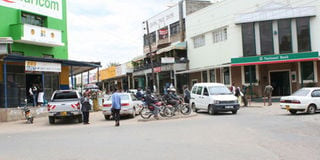Getting free goat no big deal in Kitui

A street in Kitui town. Traders in Kitui Thursday sued the county government over a law seeking to increase taxes. PHOTO | JENNIFER MUIRURI
What you need to know:
- The town has a population of 140,000 people and is the headquarters of Kitui, the largest county in the region with an area of 30,496 square kilometres. The county is sparsely populated by slightly over one million people.
- Kitui has enjoyed phenomenal growth in recent times, whose sign is the thriving construction industry. Major estates that have sprung up include Mosquito, Site and Bondeni.
When Kitui is mentioned, many people conjure up images of hunger-stricken families queuing for relief food and thirsty villagers scooping scarce water from drying-up wells surrounded by wilting shrubs and carcases of animals succumbing to severe drought... I swear that is not the Kitui I know.
Kitui is a small cosmopolitan town in South Eastern Kenya, settled mainly by the Akamba.
The local people are extremely hospitable. Getting a free goat or chicken is no big deal here. They might be poor, but their generosity is an outstanding feature of the Akamba since time immemorial.
The town has a population of 140,000 people and is the headquarters of Kitui, the largest county in the region with an area of 30,496 square kilometres. The county is sparsely populated by slightly over one million people.
The vegetation belies your typical idea of Kitui: composed mainly of evergreen plants dominated by the mango tree and some eucalyptus trees planted in the colonial times.
Kitui draws its name from a pre-colonial community well that supplied the outlying villages.
GERMAN MISSIONARY
The first European visitor, the German missionary Dr Ludwig Krapft, was told by the local people that the well was called Kitui kyaunyithya, translating as “a pivotal well for watering people and animals”. So he called the place Kitui and the later administrative location became Kyangwithya, a corruption of kyaunyithya. The area around Kitui, sandwiched between the scenic Museve hills, enjoys rainfall that is way above the extensive dry county’s average.
Two seasonal streams crisscross the town, raising the underground water table so much that you need to dig only a few feet in most estates to get a water well.
A visit to Kitui is not complete without a ride to the Nzambani Rock, a few kilometers from the town. Shaped like a man’s elbow, the two-acre mystic rock is believed to induce gender change for those tired of the way they were created. One just needs to go around it seven times a day, it is believed.
Kitui has enjoyed phenomenal growth in recent times, whose sign is the thriving construction industry. Major estates that have sprung up include Mosquito, Site and Bondeni.
The real estate business has been given impetus by the expansion of universities and colleges into the region to meet increasing demand for education.
These institutions have increased demand for hostels and residential houses. They include South Eastern Kenya University and Kenyatta University.
The effect of the incoming population is the emergence of a thriving night life. Residents flock newly opened entertainment spots in pursuit of pleasure. Friday nights are a scene to behold as skimpily dressed female college students pour into entertainment joints, making tongues to wag in this conservative town.
Economic activities in the region include farming and bee-keeping, but the region has attracted renewed interest due to the discovery of coal and limestone in Mui and Mutomo, respectively.
The writer is the author of ‘The Art of Saying No’ published online by smashwords.com, USA. www.nicholaskaloki.com




